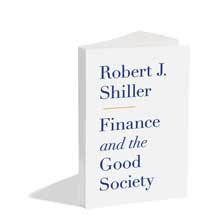
Robert Shiller teaches at Princeton University and is famous for coining the term “irrational exuberance” (and he wrote a book about it, too). And, if you’re watching the news and the commentator refers to the “Case-Shiller Index” (a national home price measure), that’s Shiller, too. In Finance and the Good Society, Shiller makes the case for fixing capitalism. Capitalism, for all its flaws, is still the best economic system to generate economic activity. But flaws like “too big to fail,” “the 1%,” “CEO compensation,” “insider trading,” and buying political influence threaten capitalism. Shiller addresses these problems in a sensible, realistic fashion. In fact, if you want to you can take Shiller’s Economics 252: Financial Markets at http://oyc.yale.edu/economics/econ-252-11. Shiller avoids most of the jargon usually mucking up books like this. If you want a readable, clear, and intelligence book on our economic problems–and options to solve them–try Finance and the Good Society.
TABLE OF CONTENTS:
Preface vii
Introduction: Finance, Stewardship, and Our Goals 1
Part One: Roles and Responsibilities
1. Chief Executive Offi cers 19
2. Investment Managers 27
3. Bankers 37
4. Investment Bankers 45
5. Mortgage Lenders and Securitizers 50
6. Traders and Market Makers 57
7. Insurers 64
8. Market Designers and Financial Engineers 69
9. Derivatives Providers 75
10. Lawyers and Financial Advisers 81
11. Lobbyists 87
12. Regulators 94
13. Accountants and Auditors 100
14. Educators 103
15. Public Goods Financiers 107
16. Policy Makers in Charge of Stabilizing the Economy 111
17. Trustees and Nonprofit Managers 119
18. Philanthropists 124
Part Two: Finance and Its Discontents
19. Finance, Mathematics, and Beauty 131
20. Categorizing People: Financiers versus Artists and Other Idealists 135
21. An Impulse for Risk Taking 139
22. An Impulse for Conventionality and Familiarity 143
23. Debt and Leverage 151
24. Some Unfortunate Incentives to Sleaziness Inherent in Finance 159
25. The Significance of Financial Speculation 168
26. Speculative Bubbles and Their Costs to Society 178
27. Inequality and Injustice 187
28. Problems with Philanthropy 197
29. The Dispersal of Ownership of Capital 209
30. The Great Illusion, Then and Now 219
And you see banks in China falling into the same bad practices.
Oh, how I miss irrational exuberance!
I miss irrational exuberance, too, Bill! There seems to be some of that in the real estate market now.
Patti, greed knows no boundaries. The Chinese banks are gouging their customers just as the U.S. banks did before the Recession.
I’m afraid I’m one of those who has lost ll confidence in financial institutions and views them as a necessary evil. Capitalism used to be different, now it’s just “profitism” and the bottom line has become a sacred calf bleeding money into the pockets of the wealthy and privileged. When drug companies refuse to make beneficial drugs because there is too little profit in them (as was reported in the news yesterday) then the profit bottom line has gone too far and no amount of wise words on the part of Shiller or others will keep the shrinking middle class from being squeezed out and ignored. Sadly, the old adage “the customer is always right” has become “To Hell with the customer, the highest profit point is always right”. Sigh.
Rick, our culture has made money the ultimate prize. So it shouldn’t come as a big surprise when banks and drug companies chase profits. Customer service becomes a low priority.
I saw Irrational Exuberance at Woodstock.
Jeff, I think Bill was referring to those heady days in the late 1990s when we were making Big Bucks in the Stock Market. But you’re right about Woodstock, too.